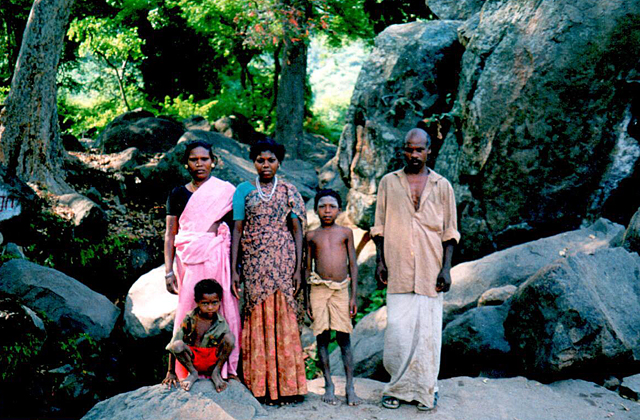Last week, a group of Paliyan women reported that forestry officials subjected them to a strip search while they were walking back from gathering in a forest. Two of India’s major newspapers reported on the allegations and the actions by officials in response to the complaints.

According to a report in The Hindu on Tuesday, July 26, Ms. S. Paputhai from the Paliyan colony of Kadamalaikundu, in the Theni District of Tamil Nadu, submitted a petition to the Superintendent of Police, V. Baskaran, on Monday July 25 complaining of the treatment that she and a group of members of the colony—five families in all—had received from some forestry officials. They had been collecting forest products in the mountains near the town of Cumbum on July 16 and were walking back toward their colony when they were stopped by four forestry officials. Led by one Ranger Sekar, the officials seized the produce the Paliyan were carrying, including some honey, and frisked the people.
Ms. Paputhai reported, “They ordered my husband and other men to remove their shirts and dhotis in the name of checking.” But her report got worse: “Later, they forced us to remove our saris in public.” She indicated that they seized a mobile phone and Rs. 2,000 (US $30) from the group.
The troubles between Forest Department officials and the tribal people continued. On July 17, a group of five Paliyan went to the Varushanadu forest office to protest the treatment of the women, so the officials arrested them and put them in prison in the city of Madurai. Forestry officials argued that the tribal people had been throwing stones at the Varushanadu forest office, which prompted the arrests.

The paper reported that the women then appealed to the Superintendent of Police plus the Collector, N. Venkatachalam, who is the highest official of the district. The Collector said that the complaint, requesting action against Ranger Sekar and the others, had been forwarded to the police in Uthamapalayam for investigation.
The Times of India, in a much briefer news story, wrote that the Paliyan woman who filed the petition on July 25 was named S. Mariammal. She alleged that forestry officials often molest and humiliate them, and they try to deny them their rights to gather produce in the forests.
The Hindu reported at the end of the week, on July 29, that on Monday last week over 15 Paliyan women crowded into the Office of the Superintendent of Police for Theni demanding that action be taken against the forestry officials for harassing the women. The Revenue Divisional Officer, a Ms. Jamuna, conducted an inquiry with the women two days later.

Also on Wednesday, Ms. U. Vasuki, a prominent Indian politician from Chennai, the state capital, who is a leader in workers’ issues at the national level, spoke to reporters about the Paliyan scandal. She said that a 13-year old girl had also been required to remove her dress, along with the women, on the pretext of frisking them. After all the harsh treatment, the Paliyans had to continue walking 40 km back to their homes. Ms. Vasuki demanded that the forestry officials be immediately arrested under the terms of the Prevention of Atrocities Act of 1989 and the Child Harassment Act. She said that the husbands of the women who were harassed had been arrested and remained in custody.
Finally on Friday the 29th, after the investigation was concluded according to the newspaper, the police did decide to take action. The paper reported that Deputy Superintendent of Police in Uthamapalayam, a man named Annamalai, has registered criminal charges against Forest Ranger Sekar, a forester named Prince, and two other staff members.
These reports last week provide fascinating comparisons between the attitudes of officials in Tamil Nadu today toward the Paliyans and the observations of Peter Gardner, whose periods of field work with that society date back to 1962. Gardner (1972) reported that the Tamil people had an attitude of superiority toward their tribal neighbors, whom they viewed as less pure and sophisticated than they were themselves. There had been many instances of harassment, ridicule, and even murders of the underprivileged Adivasi people.

While the Tamils relied on the Paliyans as guides at their forest temples, and the Paliyans often valued the availability of products from the Tamils, those conditions did not mitigate the effects of humiliation and domination of the tribal people, Gardner wrote. The legal institutions of the plains failed to protect the Paliyans since they were affiliated at the time only peripherally with the villages where those abuses took place. The standard Paliyan manner of dealing with such abuses—withdrawal—put them under social and psychological stress.
The news reports last week also allow comparisons between the attitudes of the Paliyans a half-century ago and today. While the forest did offer them protection in the 1960s—a thorn woodland that discouraged the entry of almost everyone except themselves—their constant flight into that environment simply increased their vulnerability, decreasing the likelihood that they would seek legal redress to their problems in the villages. They thus had a polarized, we/they view of the world, Gardner suggested. When they did stay and try to adjust to the larger society, they masked their feelings with superficial behaviors that allowed them to fit in.
Gardner (1985) wrote that the Paliyans, while they still lived in the forest, would not even discuss or deal with conflicts. As an example, he cited an incident wherein a contractor killed three Paliyans. The remaining villagers immediately left for the mountains. Five years later, as they were slowly moving back toward the plains, they were quite willing to be interviewed by the anthropologist on other subjects, but they would still not discuss the violent incident. At another point, one group of Paliyans suddenly abandoned their settlement when Gardner, dressed in what looked like khaki clothing, happened to show up. He may have reminded them of an incident of police brutality a few weeks before. One family suddenly felt impelled to gather its few belongings and leave, and the rest of the settlement, seeing this, quickly followed suit as if a general alarm had been sounded.
It is quite clear from the news reports last week that at least some of the Tamil authority structure is changing its ways toward the Paliyans by investigating and taking action when abuses are reported. And for their part, the Paliyans may continue to walk long distances to gather forest products for sale, but at least some of them are adopting the Tamil approach to handling discrimination and harassment by protesting, by filing complaints, and by contacting prominent advocates. The days when the Paliyans simply faded into the forest to avoid conflicts appear to be ending.